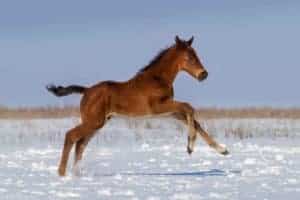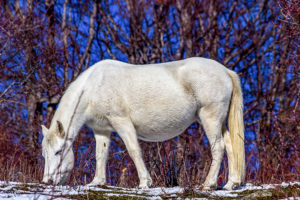
Biologic Therapies for Preventing Bacterial Endometritis
Research shows platelet-rich plasma and stem cell therapy can help treat post-breeding inflammation in mares.

Research shows platelet-rich plasma and stem cell therapy can help treat post-breeding inflammation in mares.

One theriogenologist describes equine reproductive development and how to diagnose horses with unexpected genitalia.

One veterinarian calls for cultures, cytology, and antibiotics when indicated.

A pregnant mare should maintain a healthy weight to support both the fetus’ and her own calorie needs.

Understanding potential problems during your mare’s pregnancy and after the foal’s birth could be the best way to protect them.

Although uncommon in North American horses, monitor pregnant mares to avoid abortion and stillbirth due to toxicant exposure.

Best practices whether milking a mare by hand, using a commercial device, or rigging a milker out of a syringe.

Both the stallion and mare must be in good health and fertility before you even attempt to produce a foal.

With careful management and feed selection, owners can provide broodmares with the nutrients they need to support foal growth. Here’s what our equine nutritionist recommends.

Injecting an immunostimulant directly into endometrial cups can cause them to regress, allowing broodmares that have aborted to come back into season.

Researchers found the muzzle and outer nostril region present an alternative and less invasive way to test horses for EHV-1.

Find out if your mare’s frustrating antics are due to estrus, and learn about ways to keep them in check.

Ensure your decision to breed is the right one and that you’re prepared to handle the costs and commitments involved.

An equine nutritionist explains how a broodmare’s nutritional needs change during her pregnancy.

Learn more about equine asthma, acute respiratory infections, and shipping fever in horses.

The final 100 days of gestation bring their own unique developments, changes, and challenges. Get tips to help your mare’s third trimester run smoothly.
Stay on top of the most recent Horse Health news with
© 2022 Copyright Statement dolor sit amet, consetetur sadipscing User Terms, sed diam nonumy eirmod tempor invidunt ut labore et dolore magna aliquyam erat, sed diam voluptua. At vero eos et accusam et justo duo dolores et ea rebum. Stet clita kasd gubergren, no sea takimata sanctus est Lorem ipsum dolor sit amet.
"*" indicates required fields